Professional Development and Training
DCAF develops and provides tailored courses, interactive tools, and capacity building products on security sector governance and reform (SSG/R) to support our international partners. Coming courses are available on this page.
Our tailored courses are multiday training or individual sessions for a multilateral or Interdepartmental audience with a focus on SSG/R, justice reform, preventing violent extremism, defence reform, police reform, international missions, and geographic regions, among others.
Interactive tools include strategic planning case studies, practical learning exercises, and e-learnings in both English and French.
Our capacity-building products range from training requirement assessments to monitoring and evaluation plans and lessons learned reports.
Get a quick overview in our flyer in English and French.
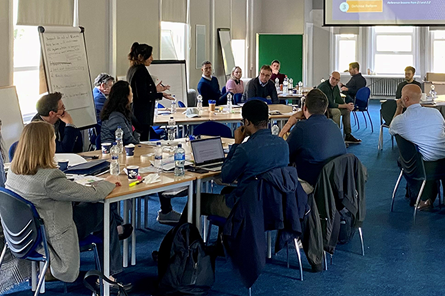
Workstreams/Projects
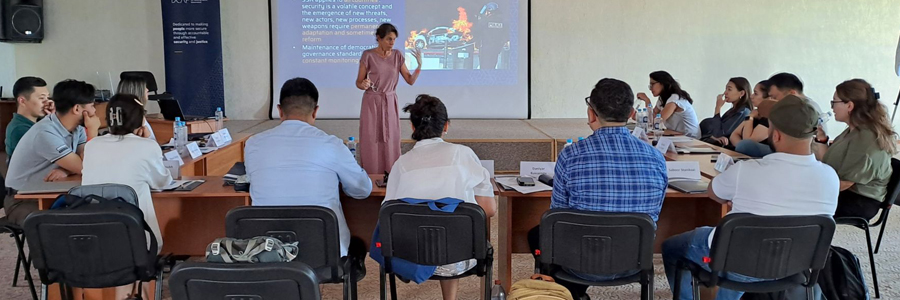
This flagship course provides participants with knowledge and practical tools on SSG/R through:
- Sessions on SSG/R, human security, access to justice, gender and inclusivity, and good governance, with a focus on both people-centered and state-centered security
- Optional focuses on justice reform, prevention of violence extremism, defense reform, international missions, police reform, and geographic focuses, among others
- Incorporating participants’ experiences
- Multi-day strategic planning exercise
Example Agenda:
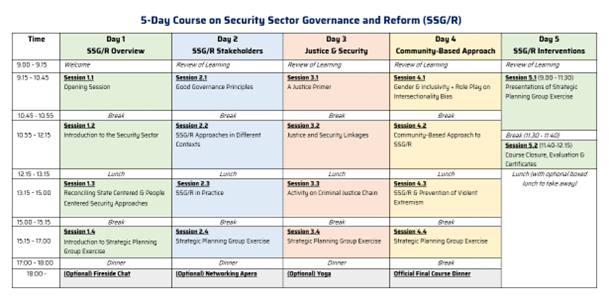
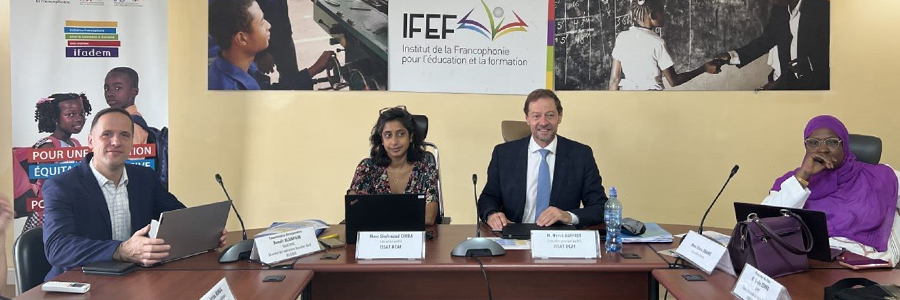
Our course on the prevention of violent extremism provides participants with knowledge and practical tools to better understand:
- Drivers of violence extremism - including root causes and triggers – in fragile and development contexts
- Security and development nexus, human security, access to justice and community violence reduction
Example Agenda:
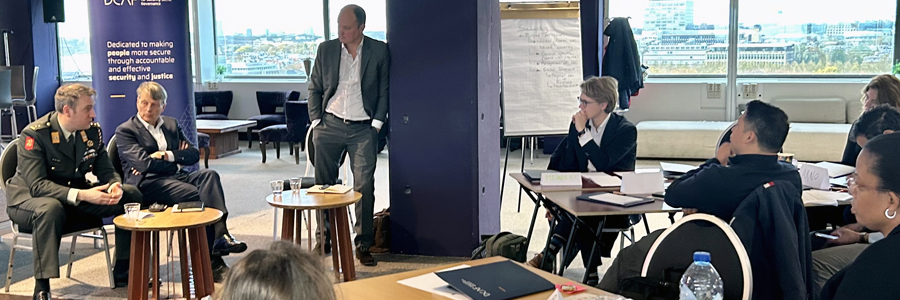
Our tailored interdepartmental course brings together governmental, ministerial and/or civil society personnel working on security and justice to:
- Share experiences, discuss concrete actions, and make recommendations for a whole of government approach to SSG/R programming in the field
- Better understand their role in fostering an integrated approach to SSG/R through enhanced networking and cooperation
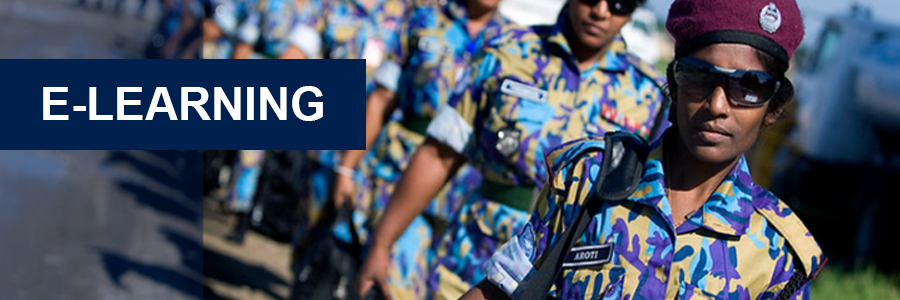
This introductory course on security sector governance and reform provides participants with:
- Overview of SSG/R, its key principles, actors and contexts within which SSG/R takes place
- Insights from experienced practitioners and practical examples
- Political and technical aspects of SSG/R
- Outlines what is meant by a people-centered and holistic approach to SSG/R
In addition, follow the course "The environment and security sector governance and reform" to understand the connections between environment and SSG/R. It goes into topics such as:
- Environmental crime
- Natural disasters and climate change
- Environmental footprint of the security sector
- And several specific focus and cross-cutting themes
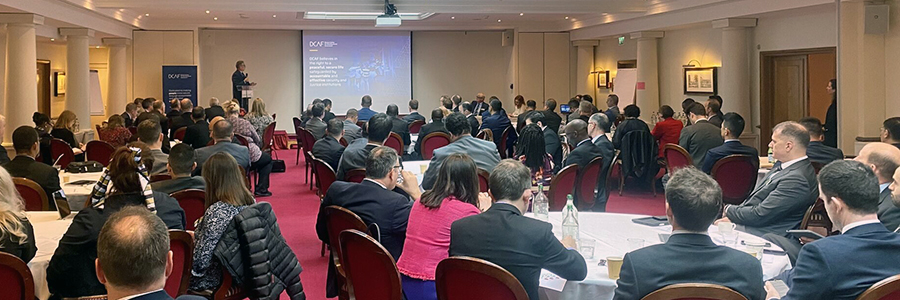
We organize roundtables, workshops, and seminars to share lessons and experiences, input on international conferences, and identify joint ventures with training partners.
We develop new courses on security challenges and work on cross cutting topics such as DDR, youth, and the environment, among others.
Training Requirements Analysis on Security Sector Reform for EU CSDP Missions
DCAF conducted a “Training Requirements Analysis” (TRA) for the European Union “Civilian Common Security and Defense Policy” (CSDP) missions in partnership with the Swedish Folke Bernadotte Academy and on behalf of the European Security and Defence College (ESDC) Executive Academic Board on SSR (EAB-SSR).
The final report, endorsed by the EU Coordination Training Group and EU Member States in March 2021, recognizes key gaps and recommendations to EU member states to improve their support to security and justice advisors, including opportunities regarding talent retention and deployment systems.
Maximising the Internal Security Benefits of International Police Missions
While demand for police officers to participate in missions is rapidly growing, the supply of available officers has stagnated or even declined. Several studies suggest that police institutions do not yet fully recognize the internal-external security nexus and maximize the benefits of seconding staff to international missions.
This brief report gives a to-the-point overview of key benefits of participation in international police missions to sending institutions. It also shows what countries do to ensure that police missions both benefit the sending institutions and contribute to security at home. The report highlights good practices that can serve as a foundation for further discussions.
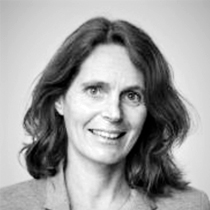 |
Marianne Ducasse-Rogier - m.ducasse-rogier@dcaf.ch Marianne has a background in international relations/peace and security and more than 20 years of experience working for international organizations, universities or think tanks in different countries. She has been involved in the teaching and training field since 2004 and enjoys combining her thematic expertise with her training and facilitation skills. Prior to joining DCAF in 2022, Marianne worked as a Senior Academy Fellow at The Netherlands Institute of International Relations “Clingendael”, where she contributed to the development of the Academy and managed the diplomatic training portfolio. She also worked inter alia as a guest teacher at Leiden University department of Political Science, as a consultant for IOM, and as an OSCE election supervisor in Bosnia and Herzegovina. Marianne has a Ph. D from the Graduate Institute of international and Development Studies, a DES from the same institute and a diploma from the Institut d’études politiques de Lyon. She speaks French, English and Dutch. |
|
|
|
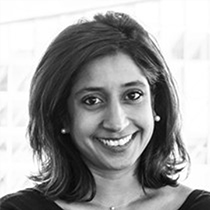 |
Shahrazad Chida - s.chida@dcaf.ch Shahrazad has 16 years of experience working on conflict resolution and Rule of Law dynamics in conflict-affected countries in sub-Saharan Africa. From 2004 to 2018, she served as a DDR and SSR Officer, as well as political analyst in various United Nations Peacekeeping operations (MINUSMA in Mali, UNOCI in Abidjan, MONUSCO in DRC). She joined DCAF in 2018. Shahrazad holds a MA in International Relations and Political Science from the Université d’Auvergne, as well as two Bachelor’s degrees in History and Art History from the Université Panthéon-Sorbonne (Paris-I). She is bilingual in English and French. |
|
|
|
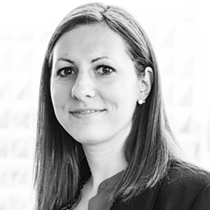 |
Eleonora Dan - e.dan@dcaf.ch Eleonora has over 10 years of work experience in managing projects and programmes for different companies and organisations. Prior to joining DCAF, Eleonora worked as Project Assistant for Merck's Access to Health Unit in Geneva. She also worked as a fund-raising volunteer for Emergency, an Italian NGO providing support to victims of war, landmines, and poverty. Eleonora holds a master’s degree in international public affairs from the LUISS School of Government in Rome, and a master's degree in international relations from the London School of Economics (LSE) and the School of Political Science at the University of Bologna. Eleonora is fluent in Italian, English, French and Spanish. |
|
|
|
 |
Floris de Klerk Wolters - f.deklerkwolters@dcaf.ch Prior to taking up this role in 2021, Floris has been at DCAF’s Asia-Pacific Unit since January 2019 and worked as student consultant researching illicit financial flows for the Centre on Conflict, Development and Peacebuilding. Floris has a master’s degree in international affairs from the Graduate Institute of International and Development Studies. Floris received his bachelor’s degree in liberal arts & sciences from University College Utrecht. Floris speaks Dutch, English, Frisian, and decent French and German. |
PUBLICATIONS
Contacts
Marianne Ducasse-Rogier, Head of Professional Development and Training (m.ducasse-rogier@dcaf.ch) or PDT Training (issat.training@dcaf.ch)


